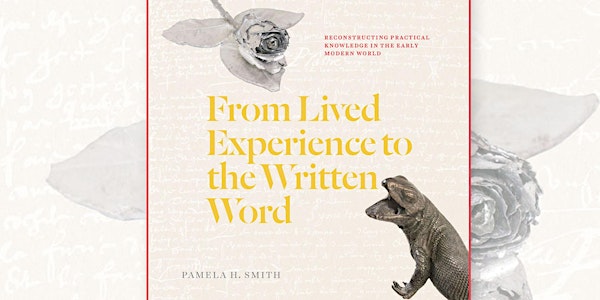march, 2024
Event Details
Date: Friday, March 1st, 2024
Event Details
Date: Friday, March 1st, 2024
Time: 12:15 PM
Location: Heyman Center for the Humanities (74 Morningside Dr, New York, NY 10027)
More information available here. Zoom link available here.
by Pamela H. Smith
In From Lived Experience to the Written Word, Pamela H. Smith considers how and why, beginning in 1400 CE, European craftspeople began to write down their making practices. Rather than simply passing along knowledge in the workshop, these literate artisans chose to publish handbooks, guides, treatises, tip sheets, graphs, and recipe books, sparking early technical writing and laying the groundwork for how we think about scientific knowledge today.
Focusing on metalworking from 1400–1800 CE, Smith looks at the nature of craft knowledge and skill, studying present-day and historical practices, objects, recipes, and artisanal manuals. From these sources, she considers how we can reconstruct centuries of largely lost knowledge. In doing so, she aims not only to unearth the techniques, material processes, and embodied experience of the past but also to gain insight into the lifeworld of artisans and their understandings of matter.
About the Author
Pamela H. Smith is the Seth Low Professor of History at Columbia University and founding director of the Center for Science and Society and of its cluster project, the Making and Knowing Project. She is the author of The Business of Alchemy and The Body of the Artisan, the latter also published by the University of Chicago Press. She is the co-editor of Ways of Making and Knowing and The Matter of Art and editor of Entangled Itineraries.
About the Speakers
Caroline Bynum works on the religious, cultural, social, and intellectual history of western Europe from late antiquity to the end of the sixteenth century. In the 1980s and 1990s, her work on gender and the history of the body established some of the paradigms still used in medieval studies. Recently her research has focused on devotional practices, especially devotional objects, in the fifteenth and sixteenth centuries. She is currently exploring the paradox of Catholic survivals, including the survival of women’s monasticism, in Protestant Germany. She is member of the Columbia University Senior Scholars and University Professor Emerita, Medieval Europe, in the History Department at Columbia University.
Deborah L. Krohn is an Associate Professor, Chair of Academic Programs, and Coordinator for History and Theory of Museums at Bard Graduate Center. Her research and teaching areas include early modern European cultural history, history and theory of museums, culinary history, and history of the book. She is most interested in exploring the relationships between objects of daily life, including the arts of the kitchen and table, and the dissemination of both learned and practical knowledge through books and prints.
Pablo Piccato is a professor in the Department of History at Columbia University. His research and teaching focus on modern Mexico, particularly on crime, politics, and culture. He has taught as visiting faculty in universities in Mexico, Argentina, Brazil, and France, and has been director of Columbia’s Institute of Latin American Studies, Vice Chair of the Department of History, and University Senator. His books include City of Suspects: Crime in Mexico City, 1900-1931 (2001), The Tyranny of Opinion: Honor in the Construction of the Mexican Public Sphere (2010), and A History of Infamy: Crime, Truth, and Justice in Mexico (2017).
Caterina Pizzigoni is an Associate Professor in the Department of History at Columbia University. She specializes in the colonial history of Latin America. Her interests include Indigenous populations, sources in Nahuatl (Indigenous language of central Mexico), social history, household and material culture, religion, and gender. You can listen to her interview with Professor Vicky Murillo (Director of ILAS-Columbia) for the podcast series Unpacking Latin America.
Please email disability@columbia.edu to request disability accommodations. Advance notice is necessary to arrange for some accessibility needs. This event will be recorded. By being present, you consent to the SOF/Heyman using such video for promotional purposes.
Time
(Friday) 12:15 pm - 1:30 pm
Location
The Heyman Center for the Humanities (74 Morningside Drive, New York, NY 10032 United States)
The Heyman Center for the Humanities (74 Morningside Drive, New York, NY 10032 United States)

